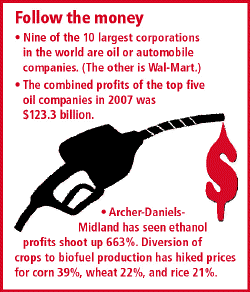Search
Democracy Links
Member's Off-site Blogs
the sump .....

As gas climbs to $5 a gallon, the pain is evident everywhere. Buses are packed. GM is closing factories. The airlines are laying off pilots and flight attendants. Independent truckers are going bankrupt. Real wages slide down and inflation shinnies skyward.
Not everyone in the U.S. is feeling the pain, however. Exxon, based in Irving, Texas, was top producer of profits worldwide for 2007. Conoco Phillips and Chevron were close behind. Their billions in profits have infuriated working people. And the heat is on politicians to do something about it. But what?
At a May hearing of Congress, oil industry execs piously called the chaos a natural and even healthy display of market forces — the law of "supply and demand" at work. Their solution: "stay the course" and drill for more oil in environmentally sensitive areas. This might make a small dent in prices in 2030! But it is good for their profits now, gets public anger off them, and sows the illusion that energy woes can be solved by eliminating environmental laws. As for global warming? Let the planet burn!
The U.S. consumes 20 million barrels of oil a day, far more for its population size than any other country in the world. Fuel efficiency in transportation, for example, which uses 27 percent of all U.S. energy consumed, has declined since 1988. While the U.S. requires a 22.5 miles per gallon efficiency for vehicles, Europe mandates 40 mpg.
Existing technology can easily produce cars with 35 mpg and save the U.S. public billions of dollars in gas and tons of pollution and climate-warming emissions. But that would also put a dent in the mega-profits of oil and auto corporations. To prevent that, oil and auto companies have successfully stymied inventions, patents, regulations, and public transit development, while Democrats and Republicans safeguard Big Oil profits at the expense of public welfare and the planet's future.
Under capitalism, Big Oil manipulates fuel supply crises to jack up their prices and profits. Major party politicians, who receive millions of dollars in campaign contributions from oil-based industries, defend and uphold this opportunistic and destructive way of operating.
So how much oil do Exxon and Chevron and Saudi Arabia etc. actually have? Nobody really knows for sure. They are accountable to no one — just as Enron answers to no one. Meanwhile, agribusinesses including Archer-Daniels-Midland promote corn-based ethanol as a great alternative, even though it drives food prices up, reduces the amount of corn available for eating, and is far less efficient than ethanol made from sugar cane.
Speculators are also in on the take. Eager to find new investment markets after the meltdown in mortgage equities, big investors are buying up barrels of oil on the market, gambling that the oil will sell for a lot more in the future. Like the housing and hi-tech bubbles, this infusion of money artificially inflates prices — until the bubble bursts. Yet speculators are no more held accountable than the oil barons. They are seen as simply taking advantage of the way the "free market" system works.
- By John Richardson at 23 Aug 2008 - 11:08am
- John Richardson's blog
- Login or register to post comments
Recent comments
58 min 48 sec ago
1 hour 30 min ago
2 hours 7 min ago
2 hours 32 min ago
2 hours 42 min ago
3 hours 54 min ago
6 hours 16 min ago
16 hours 2 min ago
16 hours 12 min ago
16 hours 24 min ago